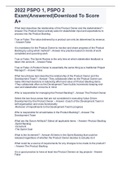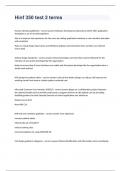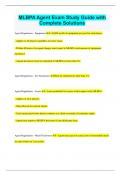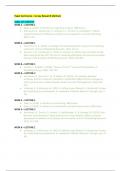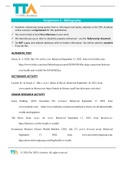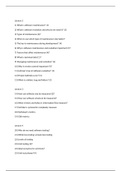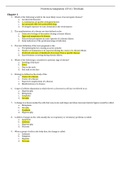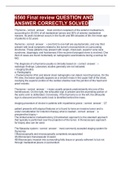HUMAN BEHAVIOR IN ORGANIZATIONS
EMOTIONAL LABOR & BURNOUT
J.G.P. JanssenMaastricht University
I6199076
11-12-2020Faculty of Psychology &
PSY3344 Neuroscience
, Abstract
Teaching is both a rewarding and demanding career. As teachers are often experiencing
symptoms of burnout and because they engage in emotional labor, the current paper is
focusing on the relationship between these three variables. Emotional labor can be defined as
the effort that is needed to express certain desired emotions during interpersonal transactions.
Burnout refers to a state of work in which people are not functioning regularly, and in which
the individual experiences emotional exhaustion, lower personal accomplishment, and
depersonalization. After reviewing literature, it can be concluded that emotional labor and
burnout have a very complex relationship with one another. Emotional labor was found to be
related to emotional exhaustion and depersonalization. To improve these working
circumstances for teachers, it is necessary to develop interventions focusing on improving
social cohesion and contact between co-workers, as well as making sure that teachers have
time to focus on other aspects of life.
Keywords: Emotional labor, burnout, teachers
1
, Introduction
Worldwide, 83.06 million individuals are classified as teachers, educating people of all
cultures and ages (Roser, 2017). Even though teaching has a very rewarding aspect to it, it is
also a very demanding career. Despite one gets to educate children in topics of interest,
teachers might find it hard to keep in mind that they are more than just a teacher, and that
there is more to life than just educating. As a teacher, it is important to find your balance,
paying attention and cherishing all parts of your identity, such as family and sports, instead of
only focusing on your career (Tapp, 2013). Teachers might find it hard to find this balance as
they deal with a lot of job-related stressors every day, such as workload, big classes, lack of
support from management, difficult behavior from students and role overload (European
Trade Union Committee for Education, 2011). When imbalance occurs for a prolonged period
of time, teachers might start dealing with burnout.
Burnout is a syndrome related to work, which often expresses itself through emotional
exhaustion, a lower sense of personal accomplishment, and depersonalization. These
symptoms might lead to teachers being less involved in their jobs, being cynical towards their
students and co-workers, and not meeting agreements and/or deadlines. Furthermore, teachers
might even stop believing in themselves, as they do not trust on their capacity to make a
difference in their profession anymore (Friedman, 2000). As a burnout does not happen
overnight, there are certain bodily symptoms that might eventually evolve into a burnout.
These symptoms include, among others, insomnia, forgetfulness, anxiety, mildly depressive
symptoms, pessimism, detachment, increased irritability, and lack of productivity (Carter,
2013).
As teachers are expected to behave in a certain way when teaching, emotional labor
might also play a role. Emotional labor is defined as ‘the effort, planning and control needed
to express organizationally desired emotion during interpersonal transactions’ (Morris &
2
EMOTIONAL LABOR & BURNOUT
J.G.P. JanssenMaastricht University
I6199076
11-12-2020Faculty of Psychology &
PSY3344 Neuroscience
, Abstract
Teaching is both a rewarding and demanding career. As teachers are often experiencing
symptoms of burnout and because they engage in emotional labor, the current paper is
focusing on the relationship between these three variables. Emotional labor can be defined as
the effort that is needed to express certain desired emotions during interpersonal transactions.
Burnout refers to a state of work in which people are not functioning regularly, and in which
the individual experiences emotional exhaustion, lower personal accomplishment, and
depersonalization. After reviewing literature, it can be concluded that emotional labor and
burnout have a very complex relationship with one another. Emotional labor was found to be
related to emotional exhaustion and depersonalization. To improve these working
circumstances for teachers, it is necessary to develop interventions focusing on improving
social cohesion and contact between co-workers, as well as making sure that teachers have
time to focus on other aspects of life.
Keywords: Emotional labor, burnout, teachers
1
, Introduction
Worldwide, 83.06 million individuals are classified as teachers, educating people of all
cultures and ages (Roser, 2017). Even though teaching has a very rewarding aspect to it, it is
also a very demanding career. Despite one gets to educate children in topics of interest,
teachers might find it hard to keep in mind that they are more than just a teacher, and that
there is more to life than just educating. As a teacher, it is important to find your balance,
paying attention and cherishing all parts of your identity, such as family and sports, instead of
only focusing on your career (Tapp, 2013). Teachers might find it hard to find this balance as
they deal with a lot of job-related stressors every day, such as workload, big classes, lack of
support from management, difficult behavior from students and role overload (European
Trade Union Committee for Education, 2011). When imbalance occurs for a prolonged period
of time, teachers might start dealing with burnout.
Burnout is a syndrome related to work, which often expresses itself through emotional
exhaustion, a lower sense of personal accomplishment, and depersonalization. These
symptoms might lead to teachers being less involved in their jobs, being cynical towards their
students and co-workers, and not meeting agreements and/or deadlines. Furthermore, teachers
might even stop believing in themselves, as they do not trust on their capacity to make a
difference in their profession anymore (Friedman, 2000). As a burnout does not happen
overnight, there are certain bodily symptoms that might eventually evolve into a burnout.
These symptoms include, among others, insomnia, forgetfulness, anxiety, mildly depressive
symptoms, pessimism, detachment, increased irritability, and lack of productivity (Carter,
2013).
As teachers are expected to behave in a certain way when teaching, emotional labor
might also play a role. Emotional labor is defined as ‘the effort, planning and control needed
to express organizationally desired emotion during interpersonal transactions’ (Morris &
2


